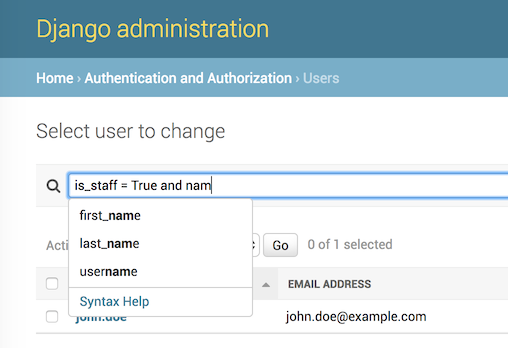DjangoQL: query mini-language that translates to Django ORM
Project description

Advanced search language for Django, with auto-completion. Supports logical operators, parenthesis, table joins, works with any Django models. Tested vs. Python 2.7, 3.5 and 3.6, Django 1.8 - 1.11. Auto-completion feature tested in Chrome, Firefox, Safari, IE9+.

Installation
$ pip install djangoqlAdd 'djangoql' to INSTALLED_APPS in your settings.py:
INSTALLED_APPS = [
...
'djangoql',
...
]Add it to your Django admin
Add DjangoQLSearchMixin to your model admin, and it will replace standard Django search functionality with DjangoQL search. Example:
from django.contrib import admin
from djangoql.admin import DjangoQLSearchMixin
from .models import Book
@admin.register(Book)
class BookAdmin(DjangoQLSearchMixin, admin.ModelAdmin):
passDjangoQL Schema
Schema defines limitations - what you can do with a DjangoQL query. If you don’t specify any schema, DjangoQL will provide a default schema for you. It would recursively walk though all model fields and relations and include everything it could find in the schema, so users would be able to search through everything. However sometimes this is not what you want, either due to DB performance or security concerns. If you’d like to limit search models or fields, you should define a schema. Here’s an example:
class UserQLSchema(DjangoQLSchema):
exclude = (Book,)
def get_fields(self, model):
if model == Group:
return ['name']
return super(UserQLSchema, self).get_fields(model)
@admin.register(Book)
class BookAdmin(DjangoQLSearchMixin, admin.ModelAdmin):
djangoql_schema = UserQLSchemaIn the example above we created a schema that excludes Book model from search, and also limits available search fields for Group model to name only. Instead of exclude you may also use include, it would limit search to listed models only.
Another use case for schemas is values auto-completion. You can optionally override .get_options() method to provide value options for auto-completion widget. In the example below we use this feature to provide options for Group names:
class UserQLSchema(DjangoQLSchema):
include = (User, Group)
def get_options(self, model, field_name):
if model == Group and field_name == 'name':
return Group.objects.order_by('name').values_list('name', flat=True)
@admin.register(Book)
class BookAdmin(DjangoQLSearchMixin, admin.ModelAdmin):
djangoql_schema = UserQLSchemaPlease note that all value options are loaded synchronously, so you should avoid large lists there.
Can I use it outside of Django admin?
Sure. You can add DjangoQL search functionality to any Django model using DjangoQLQuerySet:
from django.db import models
from djangoql.queryset import DjangoQLQuerySet
class Book(models.Model):
name = models.CharField(max_length=255)
author = models.ForeignKey('auth.User')
objects = DjangoQLQuerySet.as_manager()With the example above you can perform search like this:
qs = Book.objects.djangoql(
'name ~ "war" and author.last_name = "Tolstoy"'
)It returns a normal queryset, so you can extend it and reuse if necessary. The following code works fine:
print(qs.count())Alternatively you can add DjangoQL search to any existing queryset, even if it’s not an instance of DjangoQLQuerySet:
from django.contrib.auth.models import User
from djangoql.queryset import apply_search
qs = User.objects.all()
qs = apply_search(qs, 'groups = None')
print(qs.exists())Schemas can be specified either as a queryset option, or passed to .djangoql() queryset method directly:
class BookQuerySet(DjangoQLQuerySet):
djangoql_schema = BookSchema
class Book(models.Model):
...
objects = BookQuerySet.as_manager()
# Now, Book.objects.djangoql() will use BookSchema by default:
Book.objects.djangoql('name ~ "Peace") # uses BookSchema
# Overriding default queryset schema with AnotherSchema:
Book.objects.djangoql('name ~ "Peace", schema=AnotherSchema)You can also provide schema as an option for apply_search()
qs = User.objects.all()
qs = apply_search(qs, 'groups = None', schema=CustomSchema)Language reference
DjangoQL is shipped with comprehensive Syntax Help, which is available in Django admin (see Syntax Help link in auto-completion popup). Here’s a quick summary:
DjangoQL looks close to Python syntax, however there’re some minor differences. Basically you just reference model fields like you do it in Python code, apply comparison and logical operators and parenthesis. DjangoQL is case-sensitive.
model fields: exactly as they are defined in Python code. Access nested properties via ., for example author.last_name;
strings must be double-quoted. Single quotes are not supported. To escape a double quote use \";
boolean and null values: True, False, None. Please note that they can be combined with equality operators only, so you can write published = False or date_published = None, but published > False will cause an error;
logical operators: and, or;
comparison operators: =, !=, <, <=, >, >= - work as you expect. ~ and !~ - test that a string contains or not contains a substring (translated into __icontains);
test a value vs. list: in, not in. Example: pk in (2, 3).
License
MIT
Project details
Release history Release notifications | RSS feed
Download files
Download the file for your platform. If you're not sure which to choose, learn more about installing packages.















